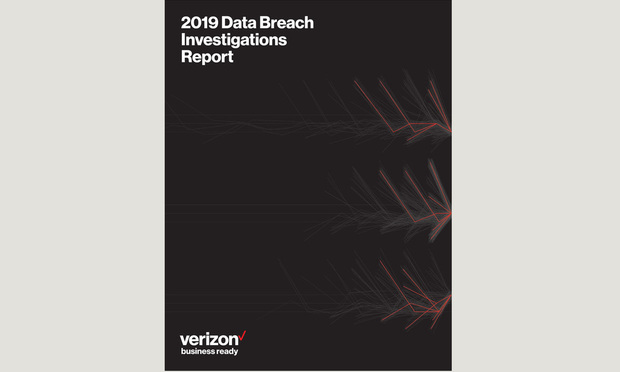Report: Executives Likely to Be Targeted for Cybercrime
Cybercriminals are finding it more lucrative to scam executives and get money through business email compromise scams, cybersecurity attorneys say.
May 13, 2019 at 07:12 PM
3 minute read
 2019 Data Breach Investigations Report. Photo courtesy of Verizon
2019 Data Breach Investigations Report. Photo courtesy of Verizon
Executives of corporations are increasingly being targeted by cybercriminals because of their access to data and ability to engage in social engineering, according to the 2019 Verizon Data Breach Report published last week.
The report was based on the analysis of 41,686 security incidents in 2018. The report noted 2,013 of those reports were confirmed data breaches. The analysis shows executives were compromised in 20% of data breach incidents studied in 2018.
It seems 71% of data breaches were financially motivated, according to the report, and the median amount stolen in a business email compromise scam was $24,439. Edward McAndrew, a partner at DLA Piper in Washington, D.C., said criminals are finding it more lucrative to scam executives and get money through business email compromise scams.
“There has also been a shift from stealing information in order to sell it and weaponizing accounts and systems to commit financial fraud,” McAndrew said.
Training goes a long way in preventing those attacks. Marcus Christian, a partner at Mayer Brown in Washington, D.C., said executives should be aware that they are targets of these kinds of attacks. He said they should put themselves in positions where they are less susceptible to attacks.
“People are more susceptible on a mobile device than they are on a computer,” Christian said. “In that medium you have a smaller screen and fewer ways of checking the authenticity of the messages you receive.”
The report further found that human resource departments are six times less likely to be targeted for an attack.
“I think the interesting thing about that is that Verizon's tracking of W2 scams really dropped a lot this year,” McAndrew said.
McAndrew explained that identities are cheap and more difficult to get. He said if hackers target an executive with a compromised business email, they'll have quicker access to funds because the executive is able to authorize the transfer of funds.
“One of the potential reasons why is that maybe we've gotten better at training on that and our human resources employees are not just falling for that scam as frequently,” McAndrew said.
The report also noted 57% of total breaches took more than one month to discover.
“We still see this dwell time gap where initial attack and compromise is taking minutes and discovery is taking months,” McAndrew said.
Jonathan Fairtlough, managing director of Kroll's cyber risk practice in Los Angeles, said in general the reason many of these attacks take time to discover is because many companies can't detect hackers once they are in a system.
“Most companies' [information technology] resources are focused on making sure everything runs well,” Fairtlough said.
Fairtlough said constant training helps, though companies should work to identify suspicious activity when it enters a system and find ways to monitor it before hackers steal important information.
This content has been archived. It is available through our partners, LexisNexis® and Bloomberg Law.
To view this content, please continue to their sites.
Not a Lexis Subscriber?
Subscribe Now
Not a Bloomberg Law Subscriber?
Subscribe Now
NOT FOR REPRINT
© 2025 ALM Global, LLC, All Rights Reserved. Request academic re-use from www.copyright.com. All other uses, submit a request to [email protected]. For more information visit Asset & Logo Licensing.
You Might Like
View All
Exits Leave American Airlines, SiriusXM, Spotify Searching for New Legal Chiefs
2 minute read


After Botched Landing of United Airlines Boeing 767, Unlikely Plaintiff Sues Carrier
5 minute readTrending Stories
Who Got The Work
J. Brugh Lower of Gibbons has entered an appearance for industrial equipment supplier Devco Corporation in a pending trademark infringement lawsuit. The suit, accusing the defendant of selling knock-off Graco products, was filed Dec. 18 in New Jersey District Court by Rivkin Radler on behalf of Graco Inc. and Graco Minnesota. The case, assigned to U.S. District Judge Zahid N. Quraishi, is 3:24-cv-11294, Graco Inc. et al v. Devco Corporation.
Who Got The Work
Rebecca Maller-Stein and Kent A. Yalowitz of Arnold & Porter Kaye Scholer have entered their appearances for Hanaco Venture Capital and its executives, Lior Prosor and David Frankel, in a pending securities lawsuit. The action, filed on Dec. 24 in New York Southern District Court by Zell, Aron & Co. on behalf of Goldeneye Advisors, accuses the defendants of negligently and fraudulently managing the plaintiff's $1 million investment. The case, assigned to U.S. District Judge Vernon S. Broderick, is 1:24-cv-09918, Goldeneye Advisors, LLC v. Hanaco Venture Capital, Ltd. et al.
Who Got The Work
Attorneys from A&O Shearman has stepped in as defense counsel for Toronto-Dominion Bank and other defendants in a pending securities class action. The suit, filed Dec. 11 in New York Southern District Court by Bleichmar Fonti & Auld, accuses the defendants of concealing the bank's 'pervasive' deficiencies in regards to its compliance with the Bank Secrecy Act and the quality of its anti-money laundering controls. The case, assigned to U.S. District Judge Arun Subramanian, is 1:24-cv-09445, Gonzalez v. The Toronto-Dominion Bank et al.
Who Got The Work
Crown Castle International, a Pennsylvania company providing shared communications infrastructure, has turned to Luke D. Wolf of Gordon Rees Scully Mansukhani to fend off a pending breach-of-contract lawsuit. The court action, filed Nov. 25 in Michigan Eastern District Court by Hooper Hathaway PC on behalf of The Town Residences LLC, accuses Crown Castle of failing to transfer approximately $30,000 in utility payments from T-Mobile in breach of a roof-top lease and assignment agreement. The case, assigned to U.S. District Judge Susan K. Declercq, is 2:24-cv-13131, The Town Residences LLC v. T-Mobile US, Inc. et al.
Who Got The Work
Wilfred P. Coronato and Daniel M. Schwartz of McCarter & English have stepped in as defense counsel to Electrolux Home Products Inc. in a pending product liability lawsuit. The court action, filed Nov. 26 in New York Eastern District Court by Poulos Lopiccolo PC and Nagel Rice LLP on behalf of David Stern, alleges that the defendant's refrigerators’ drawers and shelving repeatedly break and fall apart within months after purchase. The case, assigned to U.S. District Judge Joan M. Azrack, is 2:24-cv-08204, Stern v. Electrolux Home Products, Inc.
Featured Firms
Law Offices of Gary Martin Hays & Associates, P.C.
(470) 294-1674
Law Offices of Mark E. Salomone
(857) 444-6468
Smith & Hassler
(713) 739-1250






